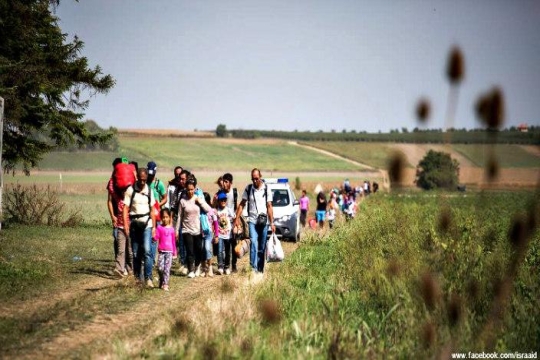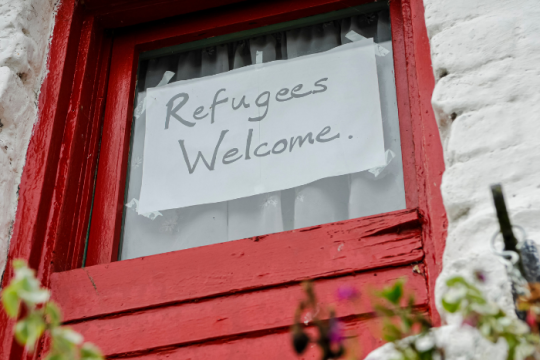Image

Photo: Tomer Neuberg/Flash90 via Times of Israel.
Passover celebrates the liberation of the Jewish people from slavery in ancient Egypt. The word for Egypt, Mitzrayim, is derived from m'tzarim, meaning ‘narrow straits.’ This imagery carries into the present, often used to describe ‘one’s narrow place,’ whether a physical challenge, a grapple with identity or a helpless situation. As we observe the holiday of Passover and face the world as it is right now, we must not stop seeking justice and working to release the shackles of narrow places where they still exist today.
Israel is currently home to nearly 38,000 asylum seekers from Africa, all of whom entered the country through the Sinai desert between the years 2005 and 2012. Twenty percent of these migrants came from Sudan, mainly Darfur, and 72 percent immigrated from Eritrea. Many of these asylum seekers fled forced military service, ethnic cleansing, and other violence in their home countries. In November 2017, Israeli Prime Minister Benjamin Netanyahu released and held discussions about a plan to purge Israel of these African asylum seekers. The plan includes an ultimatum: African asylum seekers may ‘self deport’ (i.e. voluntarily leave Israel and go to live in a country identified by Israel) or otherwise face indefinite incarceration in an Israeli detention center. The government’s plan to force tens of thousands of asylum seekers to a third country has come with a promise that this country will be safe and secure. Reports have revealed the third country to be Rwanda, a nation that does not meet the standards of safety and security demanded by populations who have already made their exodus from intense persecution in Sudan and Eritrea.
These African migrants have made their way to Israel after facing hopelessness, hunger and conflict. They packed their belongings and carried their children through the desert into Eretz Yisrael, the land of Israel. And now, after they’ve fled extreme violence, discrimination and genocide, a new Mitzrayim has been created. These immigrants have seen more than enough pain and struggle for a lifetime and have also contributed to Israel’s communities and economy for years, some for over a decade. Now, systematically, Sudanese and Eritrean immigrants are being given deportation notices with no promise of a secure future. There is tragic irony here, as we are commanded 36 times in the Torah—more than any other commandment— to welcome and love the stranger because “we were once strangers in the land of Egypt” (Leviticus 19:33:34).
Because we were strangers in the land of Egypt and because we no longer are, we urge the Israeli government to pursue alternative means to respond to the African migrants who seek refuge within its borders. Because pretending that narrow places ended when we walked across the Red Sea is not good enough, we speak out against the deportation of these vulnerable people and call it what it is—an unacceptable, disappointing and deeply concerning proposal. Because we, as Jews, know all too well the price paid when people do not act to protect the victims of discrimination, persecution and crimes against humanity, we will not stay silent on an issue that will challenge the very soul of Eretz Yisrael as a place of refuge.
The American Jewish community and people in Israel have spoken out against the decision to deport these African migrants. Many are urging Israel to Let Us Help, calling for the U.S. government to assist in relocating the migrants to more secure counties like the United States and Canada. As we observe Passover, we must turn the pain of bearing witness to the creation of a new narrow place into action.
Act now to support these African asylum seekers in Israel:
- Call your members of Congress and ask them to speak out against these imminent deportations.
- Contact the Israeli Embassy by calling (202) 364-5500 and inform them that you urge Israel to seek alternative solutions to ensure the safety and security of African migrants living in its borders.
- Continue amplifying current efforts on social media. Share and post about the efforts of the North American Jewish community and learn more about the diversity Jewish voice on this issue.
Related Posts
Image

World Refugee Day 2022
June 17, 2022
Every year on June 20, we honor the resilience and courage of refugees and celebrate their contributions to our communities and to our entire nation. The best way to honor and celebrate refugees is by taking action to make the U.S. a more welcoming place for those seeking safety.
Image

Welcoming the Stranger: How Reform Congregations are Taking Action for Refugees
February 23, 2022
This is a critical time for refugees and asylum seekers worldwide. Those in need of safe homes include Afghan refugees in addition to the millions of other displaced persons worldwide. For the past four years, the RAC has joined HIAS in dedicating a Shabbat experience to refugees and asylum seekers.
Image

Global Refugee Crisis: Where We Are and How You Can Help
February 24, 2021
As we face the world’s worst global refugee crisis, the United States has failed to do all that it is capable of to support robust refugee resettlement.

